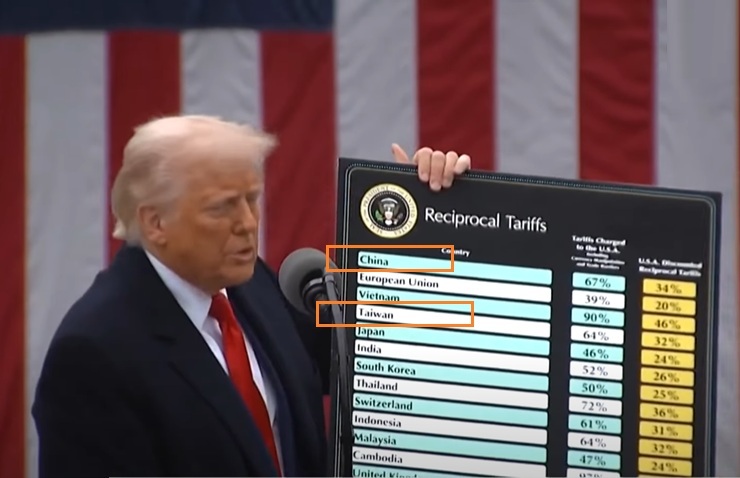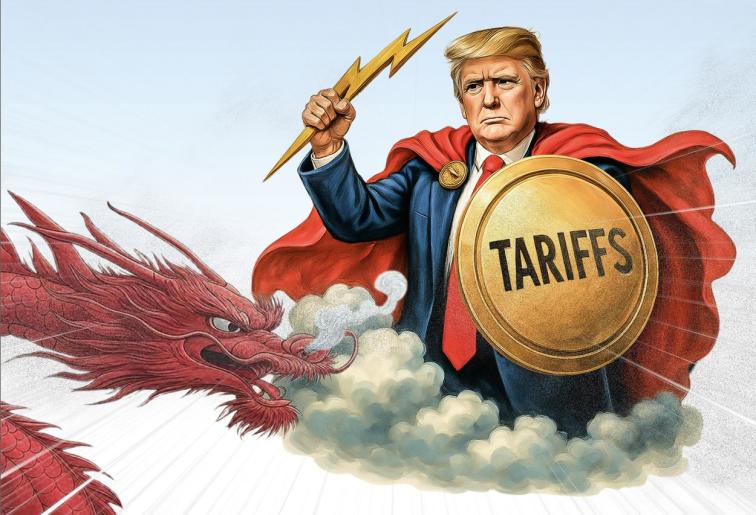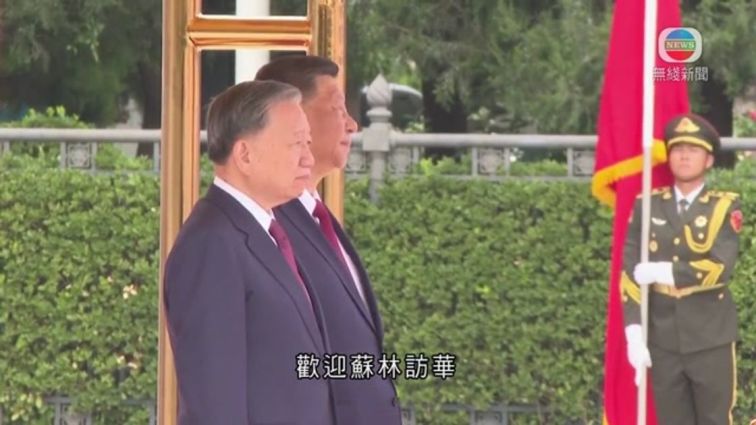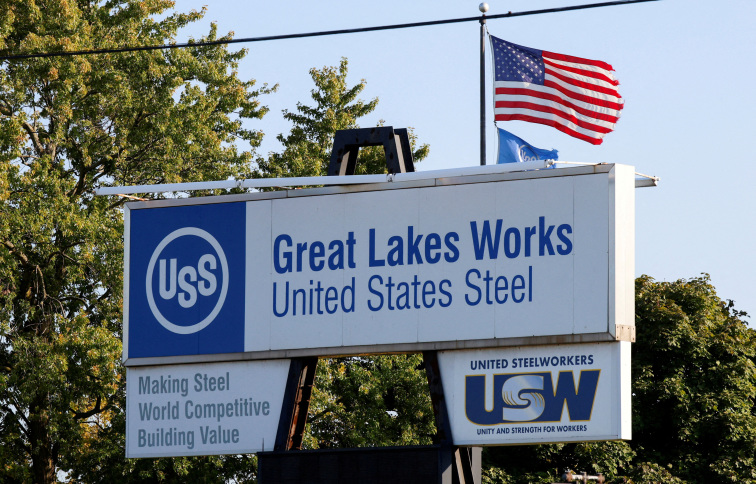U.S. President Trump announces a 34% tariff increase on Chinese goods. (Video screenshot)
[People News] On April 9, 2025, U.S. President Trump announced a 90-day suspension of 'reciprocal tariffs' on 75 trading partners, lowering the tax rate to 10%, while increasing tariffs on Chinese goods to 145%. Following this, on April 12, the White House announced that technology products such as smartphones, computers, and semiconductor equipment would be exempt from tariffs, with only a 10% tariff applied to non-American components. This decision has sparked significant debate in the market, as many technology products are imported from China, and the exemption appears to contradict Trump's tough stance on China. Meanwhile, U.S. stocks had previously seen a loss of $6 trillion in market value due to the impact of tariffs, bond market yields surged, and the dollar fell to six-month lows against the yen and the Swiss franc. After the announcement of the tariff suspension on April 9, U.S. stocks experienced what was termed a 'miracle day,' with the S&P 500 soaring by 9.5%. Is Trump's action a compromise driven by market pressure, or is it a calculated part of his negotiation strategy?
Trump's decision to temporarily suspend tariffs on technology products seems to be a reaction to market instability, but it is likely part of a carefully crafted negotiation strategy. Firstly, there is indeed market pressure. In early April, Trump announced a global tariff ranging from 10% to 50%, with China facing the highest impact, initially set at 34% and later escalating to 145%. This action led to a significant drop in the U.S. stock market, with the S&P 500 falling nearly 5% in a single day on April 3. The bond market also experienced turbulence as investors sold off U.S. Treasury bonds, causing the dollar to weaken against safe-haven currencies. Prominent business figures, including Tesla CEO Elon Musk, publicly criticized the tariffs, warning that they would increase prices and negatively affect consumers. Given that technology products are central to U.S. consumption, tariffs impacting companies like Apple and Samsung could lead to inflation and unemployment crises, jeopardizing Trump's economic promises. The market's rebound on April 9 shows that investors are highly sensitive to any relief from tariffs, a reality that Trump cannot afford to overlook.
However, viewing this action merely as a compromise is overly simplistic. Trump's trade war has never been solely focused on achieving short-term market stability; its primary goal is to reshape the global trade landscape, particularly by curbing China's economic influence. Treasury Secretary Scott Basset stated on April 9 that the suspension of tariffs is 'Trump's established strategy,' designed to 'entice China into a disadvantageous position' while also rallying allies. In fact, Trump's tax cuts for 75 countries, along with a 90-day negotiation period, successfully divided his opponents. Countries like Japan (reducing tariffs from 24% to 10%) and the European Union (reducing tariffs from 20% to 10%) quickly expressed their willingness to negotiate, while China found itself isolated due to retaliatory tariffs of 125%. The exemption for technology products further strengthens this strategy: these products are primarily assembled by American companies (such as Apple) in China, and the exemption eases the burden on American businesses and consumers, but does not directly benefit Chinese manufacturing, as tariffs still target 'non-American components.' This suggests that Trump is trying to maintain pressure on China while safeguarding American interests.
From a negotiation strategy perspective, Trump's approach closely mirrors that of his first term. In 2018, his tariffs on China ultimately resulted in the first phase agreement, while the threat of tariffs on Mexico and Canada led to the USMCA agreement. The current technology exemption can be viewed as a 'carrot and stick' strategy: by easing the concerns of allies and American businesses, he aims to gain the upper hand at the negotiating table. On platform X, some have noted that the exemption 'indirectly encourages companies to relocate their supply chains back to the United States,' which aligns with Trump’s long-term goal of bringing manufacturing back. On April 2, White House economic advisor Stephen Miller proposed the 'Mar-a-Lago Agreement,' intending to reshape the dollar-dominated global economic order, with the technology exemption potentially laying the groundwork for this, ensuring that American tech giants remain competitive in negotiations.
However, Trump’s strategy is not without its shortcomings. Market volatility has revealed the risks associated with the tariff policy, and consumer concerns about rising prices could undermine public support. While China’s economy is weak, its declaration of 'no longer responding' to tariff increases suggests a strategy of delay, potentially countering through domestic demand stimulation or non-tariff retaliation (such as limiting rare earth exports). If negotiations do not yield results within 90 days, Trump may struggle to impose further tariffs, as this could provoke a larger market backlash. Additionally, although the technology exemption alleviates short-term pressures, it may lead allies to mistakenly perceive a softening of the U.S. stance, thereby diminishing the urgency of negotiations.
Trump's temporary suspension of tariffs on technology products is not simply a compromise due to market pressures, but rather an extension of his negotiation strategy. By easing the burdens on allies and American companies, he seeks to divide his opponents and isolate China, aiming to take the lead in global trade negotiations. However, the volatility in the market and the strong countermeasures from the Chinese Communist Party suggest that this situation is fraught with uncertainties. Over the next 90 days, Trump will need to balance domestic economic issues with international pressures; if negotiations proceed successfully, it could result in a new trade agreement that benefits the United States. Conversely, if negotiations fail, an escalation of the tariff war could negatively impact the global economy. Trump's confidence may be rooted in his understanding of China's vulnerabilities, but whether he can convert this strategy into concrete victories will require time to assess.
(Originally published by the People News)









News magazine bootstrap themes!
I like this themes, fast loading and look profesional
Thank you Carlos!
You're welcome!
Please support me with give positive rating!
Yes Sure!